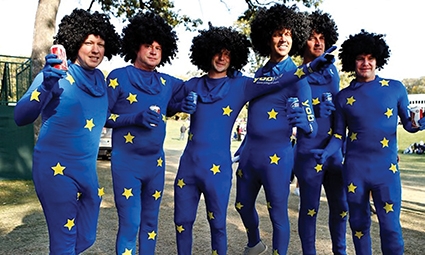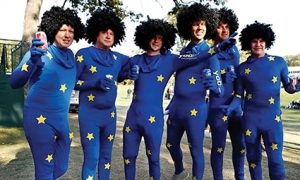Hope for the Best, Prepare for the Worst: Ogden on EU Fever
OPED
Unless you live in a cave, under Tbilisi Sea or in Gldani, you’ll have noticed that the European Union has given a positive evaluation over Georgia’s visa liberalization prospects for 2016. Monuments nationwide have been illuminated in the blue and gold of the European super-state, and people are sharing the news as though they are already sat sipping a pretentious coffee on the Champs-Élysées after spending their lifesavings in shops that even Saudi princes and American tycoons avoid for fear of bankruptcy.
Wonderful news for Georgia though this is, I can still foresee a few problems (though to be honest, with a cynical mind like mine, I’d find something to complain about in Paradise). Though Georgia is my adopted homeland and I think highly of its inhabitants (by which I mean neither like nor dislike them any more than the English or the French), Georgians can be very impulsive, reactionary and passionate, and sometimes fail to grasp the full implications of a given situation. For example, when Bidzina Ivanishvili, billionaire extraordinary and amateur weekend-politician, became the Prime Minister of Georgia, people seemed to think that they too would suddenly become extravagantly wealthy, a hope that was dashed hours after his election. In the same way, visa liberalization does not mean that many Georgians will suddenly all be given jobs at the Paris office of Vogue, sitting on the edge of a desk and addressing Cara Delivigne as ‘baby’.
The current immigration crisis is also unlikely to help Georgians who are hoping to relocate to Europe, since jobs will most likely be given to people fleeing the wars of the Middle East who have lost everything, as opposed to Georgians whose country is becoming increasingly stable. Besides which, since country and culture go incredibly deep with Georgians, most of those who do emigrate usually find themselves pining to return sooner or later.
Another issue which springs to mind is that nobody (and I include Georgians along with foreigners) has any idea what Europe is. The phrase ‘European culture’ is something I often hear from the lips of Georgians and Americans, and it means absolutely nothing. I am, according to some, a European; I don’t class myself as anything of the kind, Britain being an island separated from the continent (though I don’t even think of myself as British; angry Welshmen and dour Scotsmen have little in common with me, bouncy tigger that I am). Georgians who want to live in Europe should have a clear understanding of where they want to live and what they do there (and many do, of course, but I’ve met many more who don’t; if I had a Lari for every time I’ve heard ‘I want to live in Germany/America/Britain because it’s better,’ I’d be as rich as Bidzina…I might even run for office).
Of course, for many people all visa-liberalization will do is make it easier to on holiday. Fair enough, I say, and good luck to ‘em. But it’s the size and variety within the European Union that makes it such a cumbersome beast (just look at the immigration crisis and see how nobody can agree on anything). Like a lot of Georgians, I’m getting tired of the promises of the EU and NATO, with meaningless words and phrases like ‘bilateral partnership’, ‘deepening cooperation’ and ‘positive evaluations’ doing nothing but raising expectations. It is possible (though hopefully not likely) that the same might happen with Georgia’s visa-liberalization; after years of false promises from the West, I wouldn’t be at all surprised if somebody somewhere along the line, due to Russian pressure or backlash from the migrant crisis, delays or even aborts Georgia’s visa-liberalization. Hope for the best and prepare for the worst.
Tim Ogden












